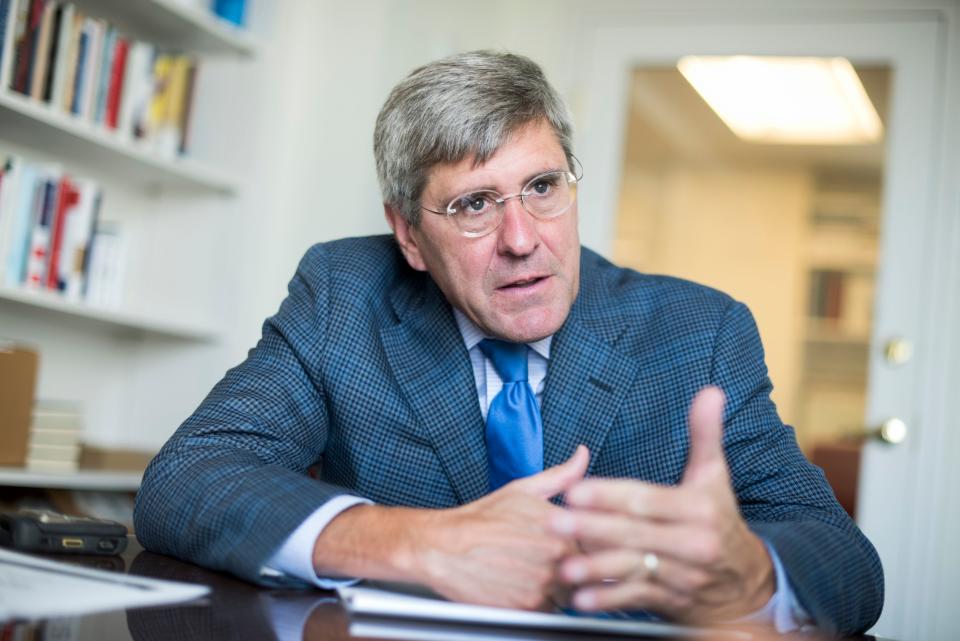Stephen Moore would bring 'supply-side' diversity to the Fed

Liberal commentators have assailed Stephen Moore, President Donald Trump's intended nominee to the Federal Reserve Board of Governors, on two main grounds: Moore has made wrong predictions on monetary policy, and he has been long associated with the conservative movement.
Yes, Moore served as economist at the Heritage Foundation and is a "supply-sider," namely someone who believes that a stable dollar and a mix of varying doses of tax cuts and discipline on public spending can boost economic growth.
While disliking a nominee for his conservative or liberal views is par for the course, that reason alone should not operate as bar to serve on the Fed. Nor should being wrong on monetary policy predictions. Even those with access to more and richer data than generally available to the public — think Fed board members and Federal Reserve chairs — have been wrong, too.
Moore's supply-side views would be a welcome addition to the deliberations of the Federal Open Market Committee, which sets interest rate policy.

Read more commentary:
Trump puts Fed independence at risk with Cain and Moore picks, but it will survive
Moore is who President Trump needs to reform the Federal Reserve
Trump adviser Stephen Moore doesn't belong on the Federal Reserve
To most monetary policy-makers, economic aggregates — such as money held in cash and different forms of credit — are important gauges of economic activity that help them keep an eye on economic expansions with an eye to taming potential inflation. Supply-side economists, like Moore, tend to focus on prices of commodities, foreign exchange and credit (i.e., the price of money in the short-term) rather than the quantity of money in circulation at a given time. These are different approaches, for sure, but conducting monetary policy requires looking into different sources of data to choose how to use the available policy levers.
The FOMC would benefit from different views. Steve H. Hanke of the Johns Hopkins University recently noted that, during the last recession, inattention to soaring dollar and collapsing commodity prices led Fed Chairman Bernanke to follow an excessively tight monetary policy (interest rates set too high) well into the fall of 2008, even though the recession had started in December 2007.
The Fed needs diversity of thought
Interestingly, the last supply siders to serve on FOMC were Manley Johnson (mid-1980s) and Wayne Angell (late 1980s to mid-1990s). And while critics such as liberal columnist Paul Krugman can point to Moore's misprediction that Obama's policies would lead to rising inflation, Moore surely was not alone in that misprediction. Despite the $700 billion stimulus package, a high tax and adverse regulatory environment damped economic prospects. That limited growth and, thus, inflation.
The jury is still out on whether it was unreasonable for Bernanke and Moore to arrive at their wrong policy judgments when they reached them. Regardless, Moore's focus on prices would add a diverse viewpoint to FOMC.
Trump appointed Jerome H. Powell, a non-supply sider, to be Fed Chair, and the Fed governors Moore would be joining all serve staggered, 14-year terms. So criticism of Moore's views seems a bit overwrought. He has the requisite understanding of the levers of monetary policy and should be confirmed.
Juscelino F. Colares is the Schott-van den Eynden Professor of Business Law and co-director of the Frederick K. Cox International Law Center at Case Western Reserve University.
You can read diverse opinions from our Board of Contributors and other writers on the Opinion front page, on Twitter @usatodayopinion and in our daily Opinion newsletter. To respond to a column, submit a comment to letters@usatoday.com.
This article originally appeared on USA TODAY: Stephen Moore would bring 'supply-side' diversity to the Fed

